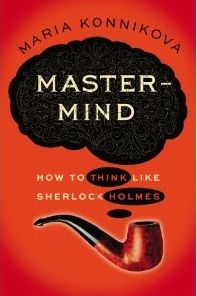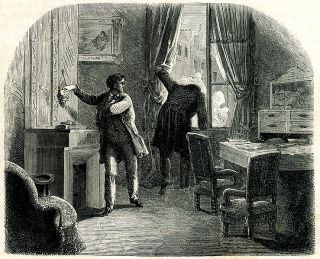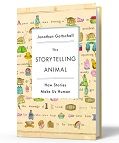Attention
How to Think Like Sherlock Holmes
Can Sherlock Holmes make you smarter, happier, and more creative?
Posted January 7, 2013

This blog is about the intersection of storytelling and psychological science. I became interested in psychology because, as a literary scholar, I wanted to understand why humans are so hopelessly story addicted. Maria Konnikova also works at the intersection of story and psychology, but she comes at it from the other way around. Konnikova, a doctoral candidate in psychology at Columbia University, wanted to understand psychology better and so she turned to literature. The result is a fun and intriguing new book called Mastermind: How to Think Like Sherlock Holmes(Viking 2013). Konnikova was good enough to answer a few of my questions.
What is distinctive about the way Sherlock Holmes thinks, and why should we want to emulate him?
Sherlock Holmes’s thinking is characterized, most of all, by its mindfulness. Holmes always uses his attentional capabilities to their fullest. The approach is summed up well by his early exchange with Watson in “A Scandal in Bohemia,” when Watson is clueless about the number of steps that lead up to 221B Baker Street, even though he walks up and down them every day, multiple times. “You have not observed. And yet you have seen,” Holmes reprimands him. What Watson must learn to do instead is to both see and observe. Not only will that make him more aware of the present moment, but it will help improve his focus, his creative ability, even his emotional well being. That’s the thing about mindfulness: it is a very small change, but its repercussions are vast. We are only now learning just how greatly a mindful approach can influence our brain in a positive direction. Mindfulness breeds concentration, creativity, and happiness. And that’s just for a start.
Why Sherlock Holmes? Why not other famous literary detectives like Agatha Christie’s Miss Marple or Hercule Poirot--or the great ancestor of all the fictional detectives, Edgar Allan Poe’s Dupin?
Sherlock Holmes, in my mind, is set apart from other famous literary detectives by one important element: he is not superhuman, despite seeming so. Everything he does, we can do, as well. He is an aspirational figure, not just a fictional hero. What he does might seem complex, but it’s really based on accessible principles of observation. Once you understand them, you want to say, like Watson, “The thing always appears to me to be so ridiculously simple that I could easily do it myself.” The trick, of course, is to learn to do it before, and not just after, the fact. But the possibility of doing it at all – that’s what makes Holmes a more appealing hero than most. I don’t think it’s a coincidence that he has become a cultural icon for generation after generation, in a way none of the other detectives have. He’s even based on a real person. But more on that next.

Auguste Dupin in Edgar Allan Poe's "The Purloined Letter" (1842).
Forgive me, but see this snip from my recent book—are these fighting words? “Sherlock Holmes’ usual method is to fabricate the most confident and complete explanatory stories from the most ambiguous clues. But Holmes’ stories invariably seize on one of a hundred different interpretations of a clue and arbitrarily insist that the interpretation is correct. This then becomes the basis for a multitude of similarly improbable interpretations that all add up to a neat, ingenious, and vanishingly improbable explanatory story. Sherlock Holmes is a literary figment. He lives in Neverland, so he always gets to be right. But if Sherlock Holmes tried to ply his trade as a “consulting detective” in the real world, he would be a dangerously incompetent boob—more like Inspector Clouseau than the genius who lives with his friend Watson at 221B Baker Street.”
I think it’s important to remember that Sherlock Holmes is based on a real life character, Dr. Joseph Bell. He is not just some haphazard literary creation. In fact, the inspiration for that famous scene where Holmes is able to tell from one quick glance that Watson fought in Afghanistan is based on none other that Bell’s ability to tell that a patient was a recently discharged noncommissioned officer in a Highland regiment, who had just returned from Barbados. As Conan Doyle wrote to Bell, “Round the centre of deduction and inference and observation which I have heard you inculcate, I have tried to build up a man who pushed the thing as far as it would go.”
True, there may be logical holes in Sherlock Holmes’s reasoning (as there were in Bell’s). But that doesn’t mean Holmes is a “dangerously incompetent boob.” Instead, it means that he is all too human: when it comes to giving explanations, we are woefully inadequate. One of my favorite papers in psychology is Nisbett and Wilson’s 1977 classic, “Telling More than We Can Know.” We don’t always have access to how we know something. We just know that we do know it. Holmes’s expertise is sometimes beyond his grasp—as is that of most experts. It’s why Gladwell was able to write his famous Blink. A blink is never just a blink. It has thousands of hours of knowledge behind it. But ask the expert why the intuition is valid, and he draws a blank. Holmes does better than most.
What is one thing readers of this blog could do — today — to use the lessons of Sherlock Holmes in order to master their own minds?
If I had to sum everything up in one short phrase, it would be this: re-learn how to unitask. Take a few minutes every day to focus on one thing, and one thing only. We’ve forgotten how to be alone with our thoughts, how to concentrate intently and ignore any pulls on our attention. Just like anything, attention must be trained. The more we engage in multitasking—a misnomer, since we’re actually rapidly switching attention between tasks—the worse we become at being able to concentrate. And that comes with all sorts of negative consequences; we even become worse at the very thing we should be better at, switching between tasks. (There’s a great study on this in last year’s PNAS.) As I write in my book, the most powerful mind is the quiet mind. We need to learn to recapture that mental presence.
Jonathan Gottschall is the author of The Storytelling Animal: How Stories Make Us Human



